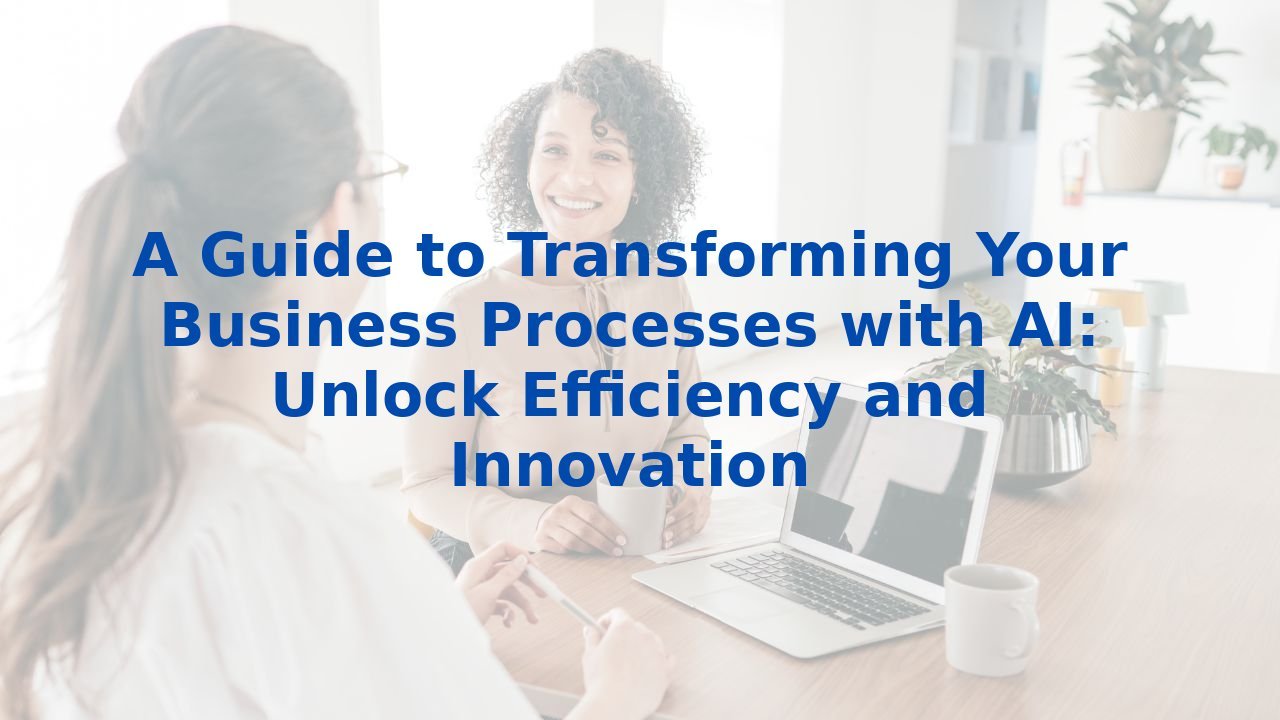A Guide to Transforming Your Business Processes with AI: Unlock Efficiency and Innovation
A Guide to Transforming Your Business Processes with AI: Unlock Efficiency and Innovation
In an era characterized by rapid evolution and competition, businesses are encompassing innovative approaches to streamline operations and drive growth. At the forefront of this transformation is Artificial Intelligence (AI), a revolutionary technology that enhances traditional business processes, unlocking unprecedented levels of efficiency and innovation.
1. Process Optimization and Automation
Business Process Management (BPM) has come a long way since its inception. Now, companies are looking at AI as a catalyst for profound optimization. AI does more than automate mundane tasks; it fundamentally reshapes how organizations manage processes.
AI in Process Simulation
With AI, organizations can delve into process simulation, leveraging historical data to identify patterns and trends through advanced machine learning algorithms. Imagine being able to test various operational scenarios before actual implementation—this is now possible. By simulating different models, companies can evaluate key performance indicators (KPIs) such as costs and timelines, leading to informed, strategic decisions.
Real-Time Monitoring and Process Mining
Real-time monitoring powered by AI illuminates the path for continuous improvement. By employing process mining techniques, businesses can visualize process flows and quickly identify deviations. This proactive stance allows organizations to nip issues in the bud, driving ongoing enhancements and ensuring smooth operational flow.
2. Enhancing Decision-Making
The stakes are high when it comes to decision-making, and AI promises to elevate this critical function. By analyzing extensive datasets—both structured and unstructured—AI extracts vital insights that guide leaders in their strategic choices.
Automated Decision-Making
Moreover, AI capabilities extend to automating decision-making processes. By recognizing patterns from historical data, AI can suggest optimal actions, freeing up human resources to focus on more complex challenges. This swift analysis reduces the risk of human error and propels organizations towards their objectives with ever-increasing speed.
3. Improving Customer Service and Sales
Customer service and sales stand to gain immensely from AI integration. The automation of routine inquiries through AI-powered chatbots enhances customer interactions, allowing organizations to focus on building meaningful relationships instead of getting bogged down in repetitive tasks.
Customer Service Automation
With the ability to assess service quality, AI doesn’t just help in maintaining standards; it also drives sales forward. By streamlining inquiries and offering timely insights, businesses can boost customer satisfaction and revenue simultaneously.
Sales Process Optimization
AI analytics are game-changers in Customer Relationship Management (CRM) systems. By pinpointing which clients are likely to drive revenue, sales teams can channel their efforts effectively. This impactful personalization transforms the customer journey, fostering better outcomes and sustained business growth.
4. Product Development and Content Generation
AI's applications reach far beyond customer-facing processes, impacting product development and content creation in dynamic ways.
Generative Design
In product development, generative design software explores all viable design possibilities utilizing AI, significantly reducing resource wastage. Rather than following traditional, often costly prototyping methods, companies can use AI to identify optimal designs swiftly, saving time and budget.
Automated Content Generation
Furthermore, AI can supercharge content creation by generating thousands of compelling lines of text in mere seconds. This capability eliminates bottlenecks in marketing and communication efforts, ensuring that organizations remain agile and responsive to market demands.
5. HR and Recruitment
Even traditional departments like Human Resources are experiencing transformation through AI capabilities.
Recruitment Automation
AI streamlines recruitment by automating initial applicant assessments. By analyzing a plethora of data points, AI ensures that only the most suitable candidates are shortlisted. This technology eliminates bias and enhances the overall recruitment experience.
Employee Experience
Enhanced employee experiences are the byproduct of AI in HR. By consolidating disjointed data concerning performance, tenure, and external market trends, AI assists HR teams in negotiating competitive remuneration packages objectively. This not only fosters transparency but builds trust within the workforce.
The Benefits of Training Employees for AI
While AI is undeniably powerful, its capabilities can be fully harnessed only when employees are adequately trained. Here are some compelling reasons for investing in AI training:
- Enhanced Productivity: Trained employees can utilize AI tools effectively, automating repetitive tasks and facilitating focus on higher-value initiatives.
- Improved Decision-Making: Employees well-versed in AI can assess data efficiently, leading to sharper, more informed decisions that resonate with the organization's mission.
- Adaptability: A workforce educated in AI is agile, readily adapting to technological advancements, securing a competitive edge.
- Reduced Errors: Training reduces misuse and mistakes, ensuring employees deploy AI tools correctly and effectively.
Conclusion
The integration of AI into business processes is not just a trend; it’s a strategic necessity for organizations wanting to thrive. From process optimization to enhanced decision-making, AI stands as a transformative force. As we usher in this AI-driven era, it's crucial for businesses to invest in both technology and the talent that will wield it effectively. By bridging the gap through training, organizations will not only embrace innovation but will do so with confidence and purpose.
To learn more about equipping your workforce with essential AI skills and capabilities, consider exploring further training options available.



